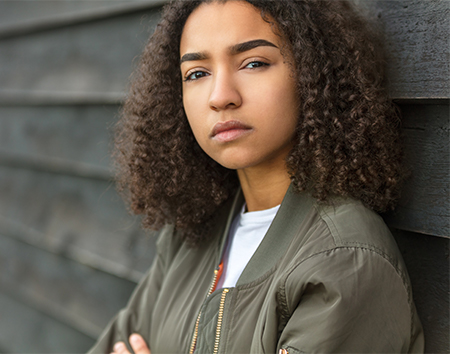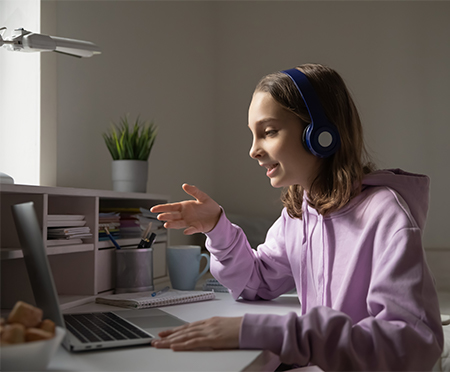“DBT [Dialectical Behavior Therapy] has completely changed my life. I wish more people
would talk about therapy. We girls, we’re taught to be almost too resilient, to be strong and sexy
and cool and laid-back, the girl who’s down. We also need to feel allowed to fall apart.”
– Selena Gomez (Vogue, April 2017)
 You’ve told your daughter how
You’ve told your daughter how
beautiful she is…
… how smart she is and how strong she is.
But somehow, she doesn’t seem to believe it.
This should be one of the finest times of her life, filled with pleasure, freedom, and enthusiasm. However, adolescence is also a time of uncertainty since even minor issues may seem like major problems for teens.
There is insurmountable pressure to live up to certain societal ideals. In particular, social media allows everyone to present a picture of perfection and rarely allows people to present their true selves outside of societal ideas. This can lead to low self-esteem or the need for excessive reassurance.
In addition to unrealistic expectations, issues such as peer pressure, dating, academic expectations, and changing bodies can bring a lot of ups and downs for teens.
It can be difficult to tell the difference between the ups and downs that are just part of being a teenager and teen depression. It affects how your teenager thinks, feels, and behaves and can cause emotional, functional, and physical problems.
 Depression can look like many things for teens.
Depression can look like many things for teens.
For many adolescents, internal battles like depression may look different from the depression symptoms of adults.
There are feelings of sadness, hopelessness, or emptiness.
They can get frustrated or easily irritated over small things. Some lose interest in or have conflicts with family and friends.
Some teens fixate on past failures or exaggerated self-blame or self-criticism – they are sensitive to rejection or failure.
Other symptoms can include trouble thinking, concentrating, making decisions, and remembering. They may also frequently complain of unexplained body aches and headaches, including visits to the school nurse often.
Their performance in school is negatively impacted, and they might decide to skip school.
You may notice a change in your teen’s appetite. They might even develop self-harm habits, cutting or burning.
 Therapy groups offer unique and exciting opportunities for growth.
Therapy groups offer unique and exciting opportunities for growth.
Support, real-time skills practice, and the opportunity to observe and change patterns are just a few advantages. Group therapy can be an economical compliment to individual therapy or a stand-alone service when appropriate.
Group therapy can effectively meet teens where they’re most comfortable, in a small setting (max. eight girls) with like-minded peers.
Group therapy can help improve your teen’s self-esteem and sense of worth in a supportive, safe environment. During the group therapy process, teen girls develop a support network with each other. They no longer feel isolated by their condition and gain a greater sense of normalcy.
I will facilitate and guide the group to help model and encourage safe and healthy conversation.
 We co-journey with teen girls…
We co-journey with teen girls…
…whether they’re struggling with feelings of sadness, anxiousness, low self-esteem, and struggling with social skills.
You may have noticed a shift in your teen’s attitude, or she may have become withdrawn and isolated. She says everything is fine when you try to talk with her, but your intuition says she may need help.
Left unaddressed, these can lead to long-term psychological and emotional issues.
What is Group for Teen Girls that includes techniques from the DBT (Dialectical Behavioral Therapy) treatment Approach?
This eight-week group for teen girls will build skills by utilizing various tools, including mindfulness, emotion awareness/regulation, distress tolerance, and maintaining positive relationships.
These groups follow a set agenda in which new information is taught weekly, and homework and skills practice is assigned. This group therapy focuses on teaching effective skills for regulating emotions, changing destructive thinking and behavior patterns, improving relationship skills, and building the life they want.
We’ll incorporate art, journaling, movement, and drama (the good kind!) to explore such topics as:
- Exploring the role anxiety, depression, fear, perfectionism, and shame play in our lives
- Improving communication skills
- Building and maintaining healthy friendships
- Increasing feelings of acceptance and worthiness
- Identifying and practicing healthy ways to cope with unpleasant/unwanted feelings
- Finding, celebrating, and living our authentic selves
- Catch social issues as they happen
- Reduce feelings of isolation. As teenagers have a limited view of the world, they can often fall into the trap of believing that they are the only person experiencing challenges
- Experience positive peer pressure through guided conversations with similar-age peers
 Things to know…
Things to know…
The group will be offered virtually through a HIPPA-compliant telehealth platform.
Weekly sessions via Zoom, every Wednesday from 5:00 pm – 6:30 pm for eight weeks.
A ‘Welcome’ email will be sent with log-in dates, times, an access code, and new member paperwork.
We will use supplies, and a virtual journal will be distributed before the start of the group.
This group is offered for middle and high school girls, and girls are grouped according to grade/age.
The busiest months for new groups to form are January, February, August, September, and October. You will be placed on a waitlist if you miss a window when we actively form new groups. The Group Coordinator will contact you when the waitlist indicates enough interest for a new group to develop (which happens often).
Adolescence can be tricky to navigate.
But the right guidance and group of girls sharing similar experiences can make overcoming your teen’s struggles easier.
Let’s help your daughter define who she is and where she stands so that she’s not trying to fit into someone else’s ideas of what is right.
Schedule a free consultation and call me at (901) 281-7169.

